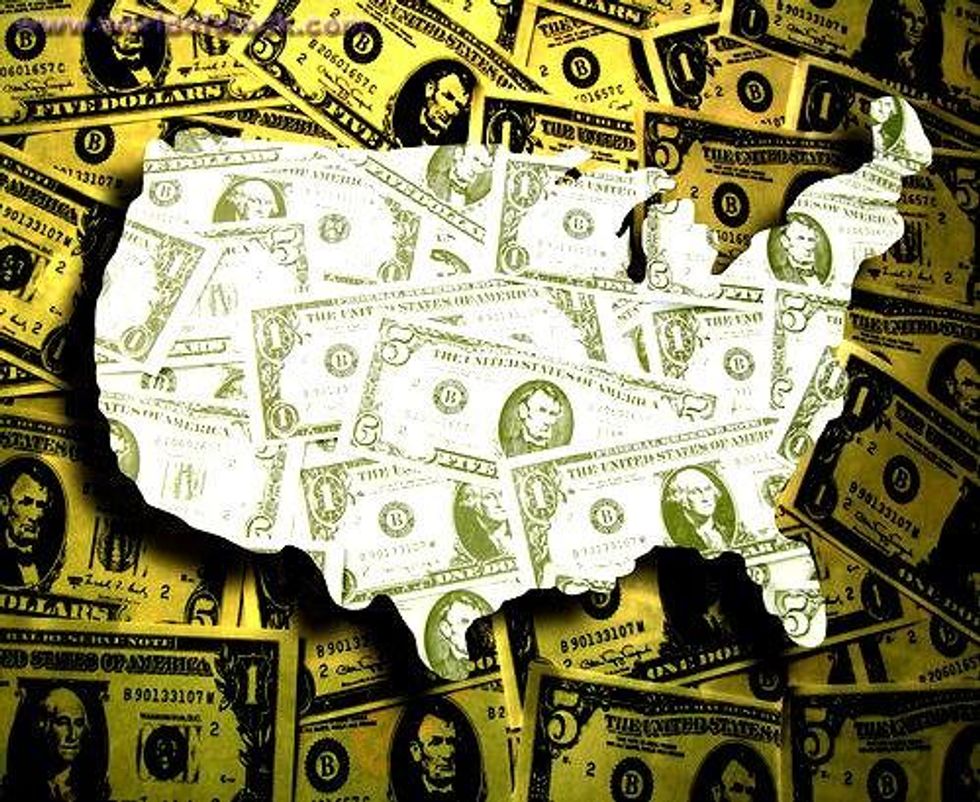A remarkable story appeared in Newsweek recently, a celebration by author Daniel Gross of America's re-emergence as the strongest economy and best darn nation in the world. An underlying theme in the article, implicit in the grandiose descriptions of our post-recession growth, is that all American lives must be improving because of the magic of our "resilient and nimble private sector." The Newsweek reader might have been reminded of the wisdom of Goldman Sachs chairman Lloyd Blankfein: "Everybody should be, frankly, happy...the financial system led us into the crisis and it will lead us out."
It sure is nice to feel good about ourselves. But it's more important to be thorough with the facts. Only a small percentage of Americans have benefited from the economic resurgence. The people with money are congratulating themselves while remaining disdainfully isolated from the real world all around them.
The article starts with the prideful assertion that "The stock market has doubled since March 2009, while corporate profits and exports have surged to records." That's all good for about 1% of us. The Americans in this elite group
captured a stunning 93% of the income gains in the first year of recovery.
The 'recovery' itself is largely a resumption of the pattern seen over the past twenty years, during which the richest 5% of Americans have steadily increased their already sizable (70% of the total) stock market holdings.
And how about those corporate profits? Something to be proud of? Here are the disturbing
facts. While profits have doubled to $1.9 trillion in less than ten years, the corporate income tax rate, which for thirty years hovered around the 20-25% level, suddenly dropped to 10% after the recession. It has remained there for three years. At a time when our country is in desperate need for revenue for education and jobs, an annual $300 billion tax payment - about a quarter of the deficit - has been avoided by the very people who have made almost all the money.
The article next gushes that productivity rose 5.4 percent in 2009. Well sure, American productivity is stronger than ever. But average workers have received
virtually none of the productivity gains since 1980. As U.S. production has become
vastly more efficient, worker pay has stopped growing.
Worse yet, this efficiency has had the perverse effect of decimating the job market. Years of increasing productivity have, ironically, diminished the need for the very people who once made the products. Young adults have been hardest hit. According to the
Bureau of Labor Statistics, the youth employment rate is at its lowest level in 60 years, with only
half of Americans aged 18 to 24 able to find a job.
Next the article highlights some of our more ingeniously profitable corporations:
-- Apple, which has made tax avoidance an art form worthy of an iPad despite its reliance on the U.S. for research, design, marketing, infrastructure, etc.
-- Google, which winds its way through Ireland, the Netherlands, and Bermuda to compete with Apple for the lowest tech company tax rate.
-- General Motors, which got bailed out with taxpayer money that hasn't been fully repaid, and which now is making record profits.
-- Boeing, which is so busy profiting from government contracts that it barely has time to cash its tax refund check.
As if to taunt us while we're down, the author notes with a hint of admiration that corporations are adept at shucking their responsibilities through bankruptcy, a redemptive technique unavailable to the millions of homeowners with unmanageable loans. That allows resourceful companies to look beyond the damage done to employees and customers and creditors while establishing "new, profitable business models."
In conclusion we are offered this lofty insight: "When the definitive history of this period is written, it is possible - no, likely - that this post-bust era will go down not as a time of economic decline, but as one of regeneration."
Regeneration? More likely we'll be remembered for "divergence," as our country's wealth gap threatens to become the largest in the industrialized world.

